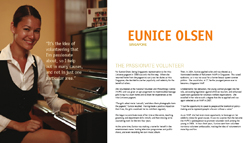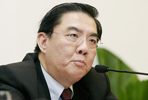The Association of Southeast Asian Nations’ (ASEAN) Secretary-General, Mr Ong Keng Yong, 53, was stuck in a unique predicament the night before the launch of the book Young Southeast Asia- 40 Inspiring Youths at the Jurong Regional Library on Nov 27.
In his own words, he was faced with a “very interesting situation” on his way to Singapore from Jakarta, Indonesia. Scheduled for an evening flight out of the Indonesian capital, he missed his original flight because a minor flood on the road to the airport brought traffic to a standstill.
Thankfully, his driver managed to make a scenic detour via kampongs (small villages) to deliver the Secretary-General to the airport in time to catch a later flight out, and he arrived home in the wee hours of the morning.

At the launch, UrbanWire caught up with the affable diplomat to get his expert views about ASEAN, the recently inked ASEAN Charter, its youths and of course, Young Southeast Asia- 40 Inspiring Youths which, according to the press release, “contains profiles of 40 exceptional, inspirational, and interesting young individuals” across ASEAN and also commemorates the organisation’s 40th anniversary.
UW: As its Secretary-General, what do you think is the greatest thing about ASEAN?
“It’s quite a remarkable feat to have 10 different countries coming together. And don’t forget we have so many different ideals, so many different backgrounds and we need to find a common position on many of the issues. So as Secretary-General, one of my biggest tasks is to always bring about the comfort level for every one of our countries to exchange views about a particular issue and to come around and agree to take the common ASEAN stand.”

UW: Of the 40 stories in the book, Young Southeast Asia- 40 Inspiring Youths, which particular one caught your attention the most?
“I would say that all the stories captured my attention because they all represent a certain achievement in each of their respective fields so I will not pick out any one in particular. But what I want to say is that the most outstanding feature of the book is the ability of the photographer to bring across the spirit and the mood of each of the 40 individuals. That I think is the most outstanding characteristic of this book.”
UW: The book portrays ASEAN as a culturally diverse and unique region. Personally, which country in ASEAN has left the greatest impression on you.
“[Laughs] It’s a very hard question. I’d like to say that I find the dynamism in Vietnam the most remarkable. Every one of the people there has now taken charge of their respective positions. They exploit the opportunities and they want to do more. They are hungry for success so to speak. So it leaves a very good impression on me.”
UW: With the ASEAN charter set to begin in 2015, what do you think is the role that ASEAN youths will play when that happens?
“Well, the ASEAN charter, we have signed it, we have 1 year to ratify it and we hope that by the end of 2008, beginning of 2009, it will be in place. So this will bring about more formality, more predictability and more accountability. And in that respect, youths around the ASEAN region can see what this organisation will be. It is a worthy organisation and it should be something that they can support. The important thing about ASEAN is that we have to implement what we agree to do. By implementation, we will be able to win more respect and more credibility. And the more we become credible, the more I think young people would like to participate in ASEAN’s programmes and activities and to contribute in their own way to their own country’s advancement and progress.”
UW: What’s your take on ASEAN’s 40th Anniversary theme song sung by Stefanie Sun?
“It’s brilliant. Simple, catchy and I think the words are very inspirational.”
UW: It’s appropriately named “Rise”. From your experience, how do you think ASEAN has risen through the years?
“We have different historical periods which we journey. And over the last 4 decades, every difficult situation we’ve managed to overcome and we came out stronger. So I thought that the song “RISE” is most appropriate and conveys the accomplishment of ASEAN in the last 40 years.”
UW: ASEAN has been around for 40 years but it seems that plenty of Singaporeans, especially the young, have little awareness or understanding about our neighbours. How do you think this particular situation can be improved?
“We have to develop more publicity programmes. Do things like what we’ve seen today like the book launch, community events like sports and games. And maybe at the school level, at the university level, we can organise more ASEAN studies, organise competitive activities like interactive games on the Internet, debates, other things that’ll bring about more awareness. But at the end of the day, I think the awareness will come about if our ASEAN countries carry out and implement what they agree to do. And then when certain things have been implemented, there will be credit for ASEAN, there will be recognition that ASEAN has brought about such kind of results. And this will be, by itself, good publicity for us.”
UW: With Singapore being a first-world country, how do you think we can contribute to the rest of the region?
“We can, number one, show greater appreciation of the specific difficulties in each of our neighbouring countries. Sometimes we tend to have what you call a ‘one-size-fits-all’ attitude. And as you can see, different countries in Southeast Asia have different levels of achievement and development. So we need to appreciate each of their status, and each of their concerns and characteristics.
Number 2, we have achieved good progress in human resource development. Every Singaporean has his or her potential fully discovered. I think this “software” can be imparted to the rest of our friends in the region. So, capacity building, improving the capabilities of agencies and non-government bodies in our neighbouring countries would be a good way to showcase Singapore’s own progress and development.
And the third thing is that, we are relatively well-off. Whenever there is a need for us to chip in for a particular natural disaster or other kinds of difficulty, Singapore and Singaporeans should be ready to help out. It doesn’t cost a lot. It’s how much we are expressing our camaraderie, our team spirit with our friends in the region.”
UW: With the SEA Games coming up in Thailand, how do you think this helps to bring the regional community closer as one big family?
“Sports is always a good way of promoting cooperation and understanding among each other. So I think we should send more sportsmen, sportswomen, and, on top of that, we must also send good cheerleading teams and supporters; don’t just leave our sportsmen and sportswomen on the field by themselves. And the more we participate in this kind of sporting events, the more networking we can have, the more camaraderie we can have among Southeast Asians. Don’t forget, sports is not just to win medals. Sports is a way to keep fit, to make friends and to inspire our own selves to do more things with our physical and mental abilities.”
UW: At the end of the day as the outgoing Secretary-General, what is your greatest wish for ASEAN?
“I hope we can put aside many of the national sensitivities. There is a space for ASEAN, and if we can grow this space for ASEAN, strengthen it and leverage on each other’s strengths, I think ASEAN can be a very strong regional body. And with that strong regional body, we can actually do more for the region and each one of us will benefit.”
Young Southeast Asia: 40 Inspiring Youths is available in all major bookstores.
Read UrbanWire’s review of Young Southeast Asia: 40 Inspiring Youths here.

